If you’ve been told you need to see a thoracic surgeon, you’re probably wondering exactly what that means and what to expect. This comprehensive guide will help you understand everything about thoracic surgeons, the conditions they treat, and how they can help you recover and return to health.
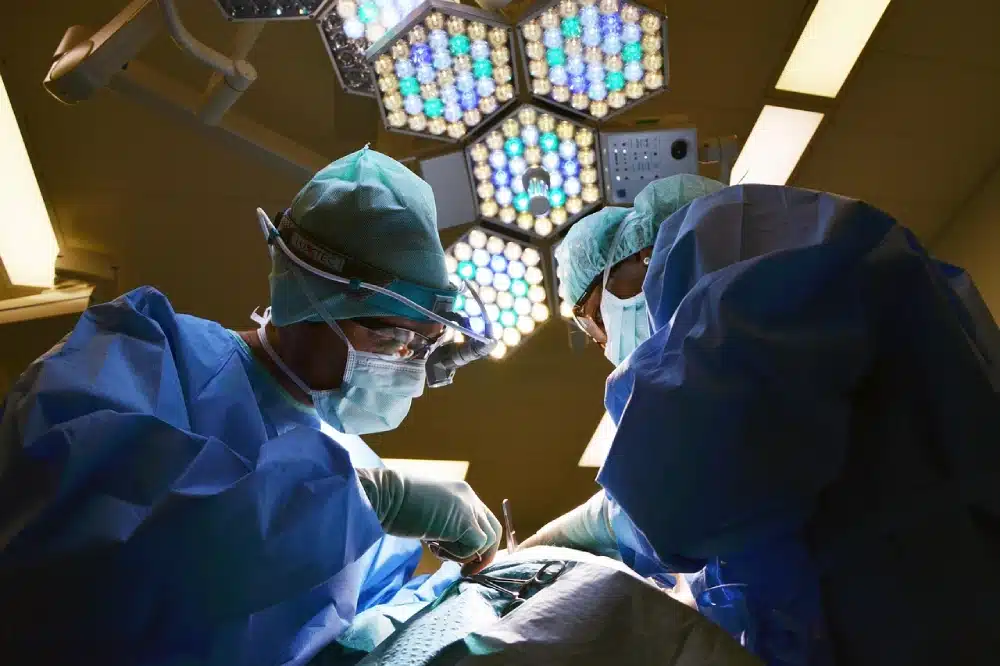
Understanding Thoracic Surgery: The Basics
A thoracic surgeon is a medical specialist who performs surgical procedures on organs within the chest cavity, excluding the heart and major blood vessels. After completing medical school and general surgical training, these doctors undergo additional specialty training specifically focused on chest surgery.
The chest cavity contains vital organs, including your lungs, oesophagus, diaphragm, and the structures of your chest wall. When these organs develop problems that can’t be treated with medication alone, a thoracic surgeon steps in to provide surgical solutions.
What sets thoracic surgeons apart is their expertise in both traditional invasive surgery and cutting-edge minimally invasive techniques. Modern thoracic surgery has evolved dramatically, with many procedures now performed through small incisions using advanced technology like video-assisted thoracoscopic surgery and robotic surgery systems.
Thoracic Surgeon vs Cardiac Surgeon: What’s the Difference?
This is one of the most common sources of confusion for patients. While both specialties work in the chest area, they focus on different organs and conditions:
Thoracic Surgeons specialise in:
- Lung disease and lung resections
- Oesophageal cancer treatment
- Chest wall deformities
- Pleural effusion management
- Diaphragmatic conditions
Cardiac Surgeons
They are also called cardiothoracic surgeons when they combine both specialties, focusing on the following heart issues:
- Heart disease and heart failure
- Coronary artery disease and bypass surgery
- Heart valve repairs and heart transplant procedures
- Congenital cardiac surgery
- Blood vessel repairs
- Cardiothoracic surgery
Some surgeons train in both areas, becoming cardiothoracic surgeons who can perform both chest surgery and cardiac procedures. However, many choose to specialise in one area to develop deeper expertise.
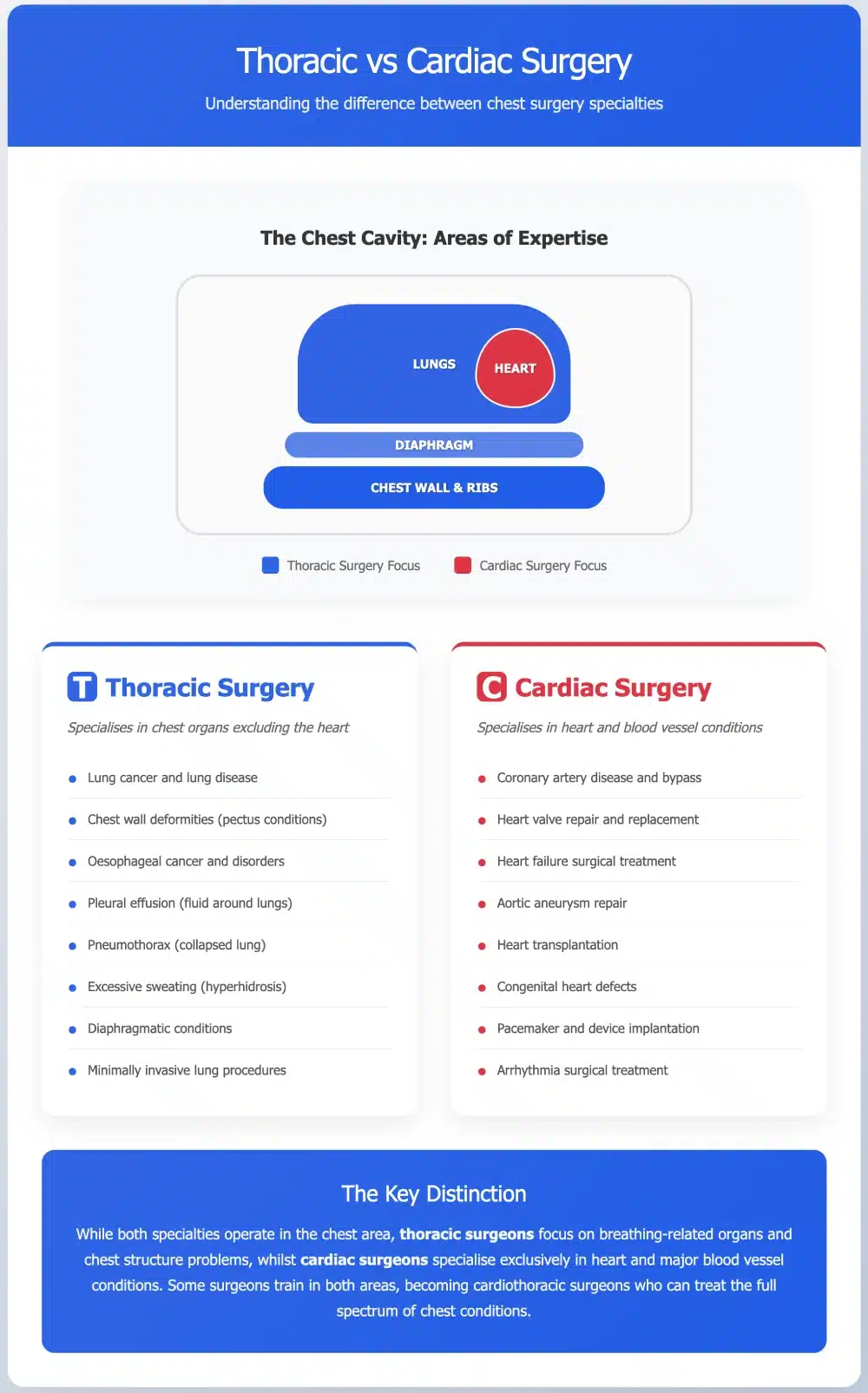
Common Conditions Treated by Thoracic Surgeons
Thoracic surgeons treat a wide range of conditions affecting lung function and chest structures. Understanding these conditions can help you know when thoracic surgery might be necessary:
Lung Conditions
- Lung cancer requiring surgical removal
- Benign lung tumours
- Pneumothorax (collapsed lung)
- Severe emphysema requiring lung transplant evaluation
- Infections that haven’t responded to other treatments
Chest Wall Issues
- Pectus deformities (sunken or protruding chest)
- Rib fractures requiring surgical repair
- Chest wall tumours
- Thoracic outlet syndrome
Other Thoracic Conditions
- Oesophageal cancer and swallowing disorders
- Excessive sweating (hyperhidrosis)
- Pleural effusion (fluid around the lungs)
- Diaphragmatic problems affecting breathing
Types of Thoracic Surgery Procedures
Modern thoracic surgery offers various surgical procedures tailored to each patient’s specific condition and overall health:
Minimally Invasive Approaches
- Video-assisted thoracoscopic surgery (VATS) using small incisions
- Robotic surgery for enhanced precision
- Thoracoscopy for diagnostic and therapeutic purposes
Traditional Surgical Procedures
- Lobectomy (removing part of a lung)
- Pneumonectomy (removing an entire lung)
- Chest wall reconstruction
- Oesophageal resection and reconstruction
The choice between minimally invasive techniques and traditional invasive surgery depends on factors like the size and location of the problem, your overall health, and the surgeon’s assessment of the best approach for optimal clinical outcomes.
Most patients today benefit from the minimally invasive approach, which typically means shorter recovery time, reduced hospital stay, and less post-operative discomfort compared to traditional open surgery.
The Thoracic Surgery Team
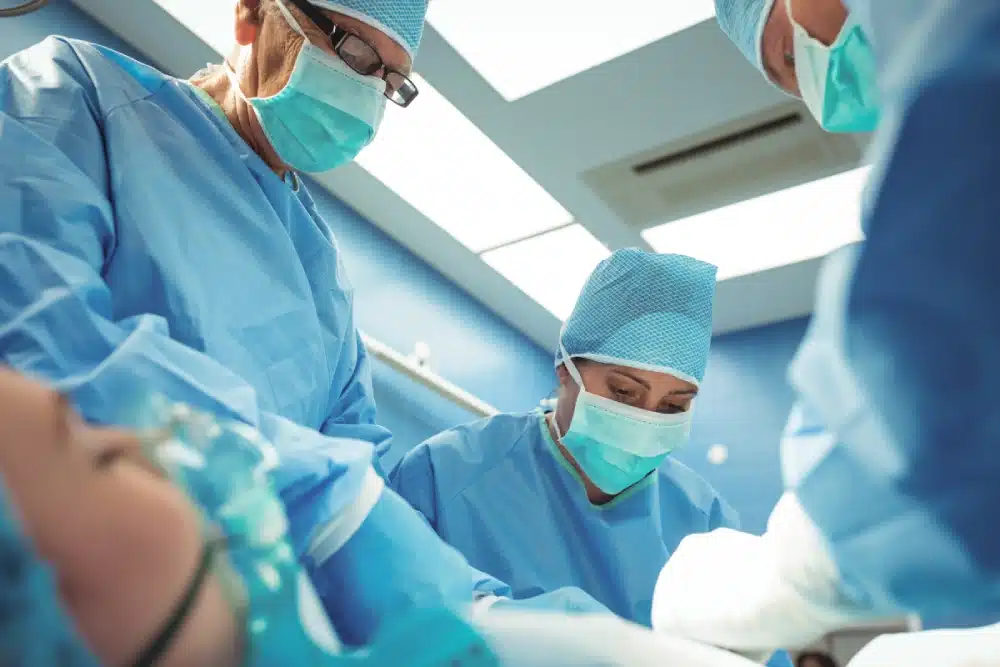
When you’re treated by a thoracic surgeon, you’re actually cared for by an entire team of specialists working together:
Core Team Members
- Consultant Surgeon leading your care
- Consultant Anaesthetist managing your comfort during surgery
- Specialist nurses with thoracic surgery expertise
- Respiratory physicians who understand lung function
- Clinical Lead coordinating your treatment pathway
Extended Support Team
- Nursing staff in surgical units and intensive care unit
- Physiotherapists helping with recovery
- Dietitians for nutritional support
- Social workers assisting with discharge planning
This multidisciplinary approach ensures you receive comprehensive care from diagnosis through recovery, with each team member contributing their expertise to achieve the best possible clinical outcomes.
What to Expect: From Consultation to Recovery
Initial Consultation
Your first appointment involves discussing your symptoms, reviewing test results, and examining you thoroughly. The surgeon will explain your condition, discuss treatment options, and answer your questions about the surgical procedures being considered.
Pre-Surgery Preparation
If surgery is recommended, you’ll undergo additional tests to assess your lung function and overall fitness for the procedure. The team will provide detailed instructions about preparing for surgery.
The Surgery Experience
On the day of surgery, you’ll meet your Consultant Anaesthetist and the surgical team. Most thoracic procedures are performed in specialised surgical units equipped with the latest technology.
Recovery and Follow-Up
Recovery time varies depending on the procedure and your individual healing. Minimally invasive surgery typically allow for shorter hospital stays and faster return to normal activities. Regular follow-up appointments ensure your recovery progresses smoothly.
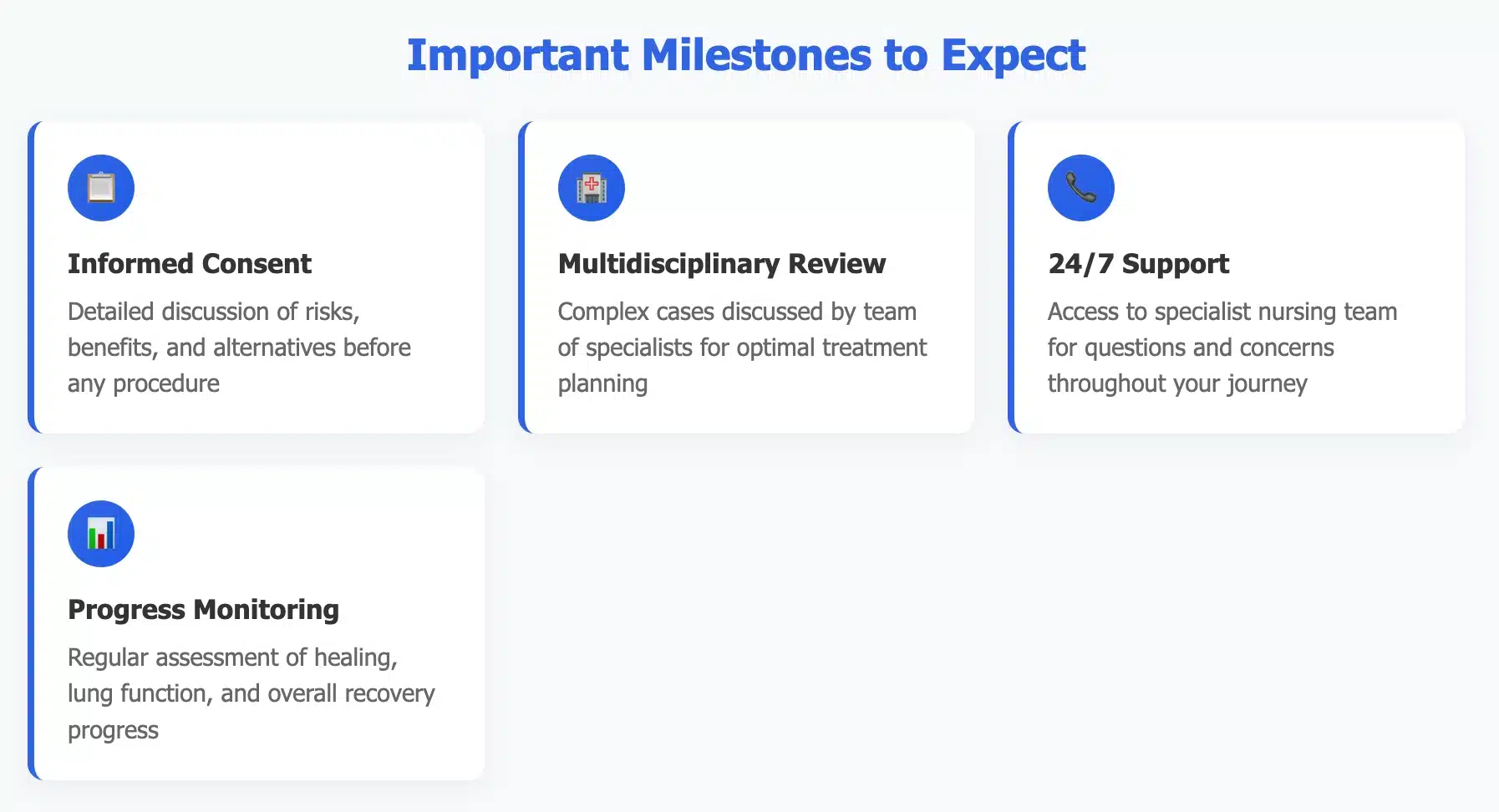
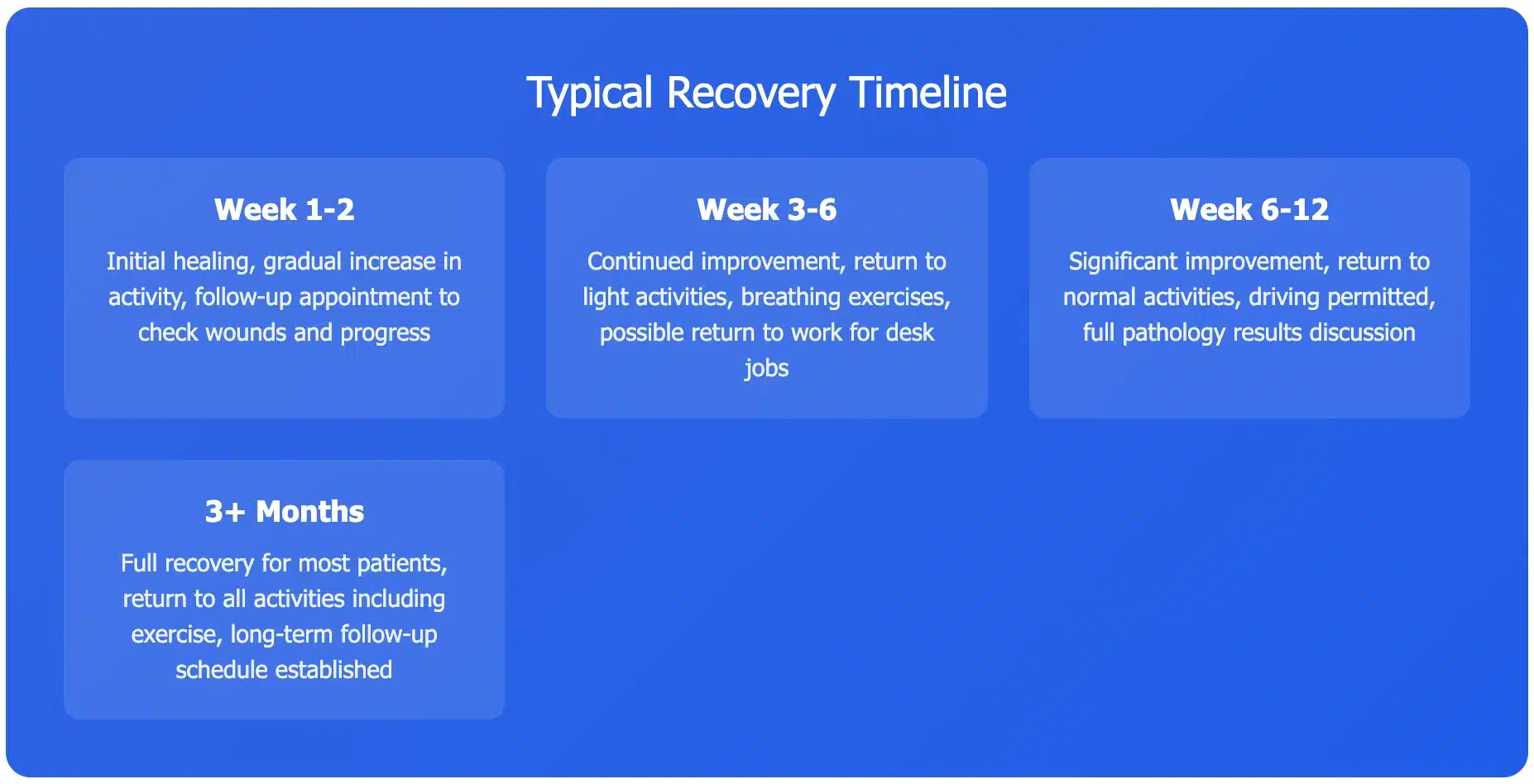
When Should You See a Thoracic Surgeon?
You might be referred to a thoracic surgeon if you have:
- Persistent chest pain or breathing difficulties
- Abnormal findings on chest X-rays or CT scans
- A confirmed or suspected lung tumour
- Chest wall problems affecting your quality of life
- Severe lung disease not responding to medical treatment
Many patients see thoracic surgeons through outpatient clinics after referral from their GP or a respiratory specialist. Don’t hesitate to ask questions about why you’re being referred and what to expect.
Finding the Right Thoracic Surgeon
When choosing a thoracic surgeon, consider:
- Their training and experience with your specific condition
- Hospital affiliations and access to advanced technology
- Approach to minimally invasive techniques
- Patient feedback and clinical outcomes
- Communication style and how comfortable you feel
For patients in London, Mr Marco Scarci offers extensive experience in minimally invasive thoracic surgery across leading London hospitals, combining technical expertise with a patient-centred approach to care.
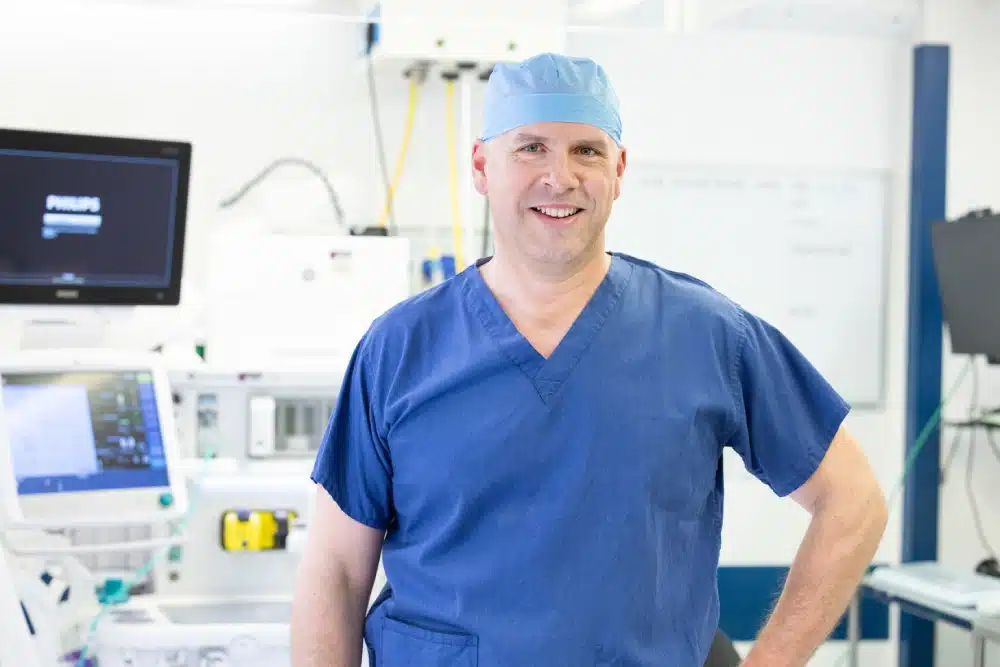
Frequently Asked Questions
What does a thoracic surgeon do?
A thoracic surgeon performs surgical procedures on organs in the chest cavity, including the lungs, oesophagus, diaphragm, and chest wall, but excluding the heart and major blood vessels.
What is the most common thoracic surgery?
Lung resections for cancer treatment are among the most common procedures, along with procedures to treat pneumothorax and chest wall deformities.
Why would I be referred to a thoracic surgeon?
You might be referred for suspected lung cancer, chest wall problems, severe breathing difficulties, abnormal chest imaging results, or conditions that haven’t responded to non-surgical treatment.
What is the difference between a thoracic and cardiac surgeon?
Thoracic surgeons focus on lung disease, chest wall, and oesophageal conditions, while cardiac surgeons specialise in heart disease, coronary artery bypass surgery, and heart transplant procedures.
Moving Forward with Confidence
Understanding what a thoracic surgeon does and what to expect from treatment can help reduce anxiety about your diagnosis and upcoming procedures. Remember that thoracic surgery has advanced significantly in recent years, with minimally invasive techniques offering better outcomes and faster recovery for many patients.
If you’re facing thoracic surgery, focus on finding an experienced surgeon who communicates clearly and makes you feel comfortable with the treatment plan. With proper care and expertise, thoracic surgery can effectively treat many chest and lung conditions, helping you return to better health and improved quality of life.
The field of thoracic surgery continues to evolve, with ongoing research improving surgical techniques, reducing recovery times, and enhancing patient outcomes. By staying informed and working closely with your medical team, you can feel confident about your treatment journey.